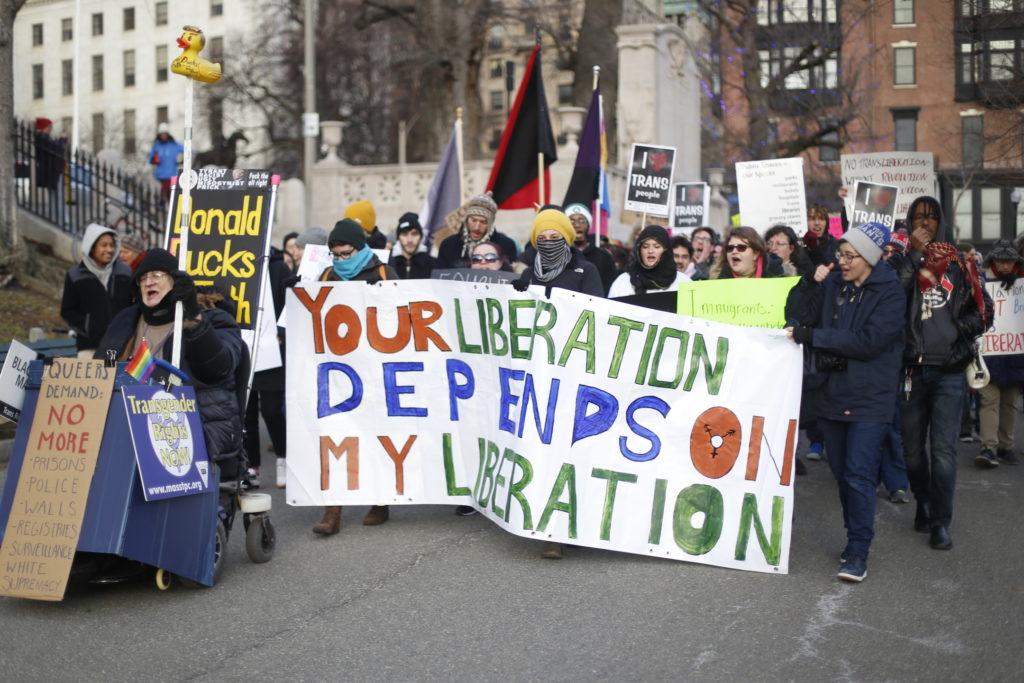By Jillian Wrigley, news staff
Hundreds of people gathered in front of the Massachusetts State House Saturday afternoon to protest against LGBTQA+ discrimination at the Trans and Queer Liberation Rally and March. The rally began around 2 p.m. in the Boston Common.
Rally-goers were in a celebratory mood as they laughed, listened to music performed by street band School of HONK and waved signs with a variety of messages, including “Assimilation is not trans liberation” and “Donald Ducks the Truth.”
The event brought together individuals from 30 coalitions and activist groups including Black and Pink, TransCEND and the Mass Trans Political Coalition (MTPC). The groups aimed to form an intersectional coalition of different minorities to comment on an array of issues including trans accommodations, immigration rights, racial bias and police surveillance.
Paul Sindberg, a junior political science major at Brandeis University, said that as a queer and radical person, he wanted to be a part of building a more intersectional community.
“There are people at this rally who subscribe to all the different identities we are talking about, none of these identities exists in a bubble,” he said. “And we’ve witnessed repeatedly that the mainstream gay movement is not about celebrating those identities. It’s about ignoring them and seizing privilege where they can get it.”
After opening the rally with speeches and calls to action, the group began their mile-long march from the Boston Common to the Trinity Church in Copley Square. Led by an escort from the Boston Police Department (BPD), the group stopped traffic along Beacon Street and Newbury Street all while chanting, playing music and waving to the bystanders watching in storefront windows.
“Hey hey ho ho, transphobia has got to go,” the crowd chanted.
President-elect Trump’s anti-immigration policy proposals was among the main issues discussed.
“Call your local officials and tell them you support immigrants rights,” Michelle Tat, one of the event organizers and a Mass Trans Political Coalition representative, said to the crowd. “Tell them you support Boston becoming a sanctuary city.”
In addition, demonstrators criticized other local institutions such as BPD and the Massachusetts state government’s actions towards minority groups.
Specifically, the speakers condemned the BPD plan to spend $1.4 million on surveillance of public social media platforms.
“On a local level, we denounce the continued surveillance and oppressive policing of communities of color here in Boston, Jasmine Gomez, another event organizer, said to loud cheers from the crowd. “In a free society, police should only be monitoring people suspected of crimes, not the entire population.”
The day before the rally, the BPD released a statement claiming that they will not move forward with their plan to acquire this surveillance technology at this time.
“After reviewing the submitted proposals I felt that the technology that was presented exceeds the needs of the department,” Police Commissioner William B. Evans said in a statement. “I met with Mayor Walsh and with his support we have decided not to enter into a contract at this time.”
After the rally, Gomez said that the news from BPD was a welcome step that was brought about by the work of determined activists in the City of Boston.
“I know this is the work that’s been happening because of a lot of really amazing organizers,” Gomez said. “People have been fighting this since they first announced it. So, it’s like that affirmation and validation that when you resist, when you push back, you stand up for your rights and the rights of other people, then there’s success.”
A recurring issue brought up by many of the speakers was the recent proposal to repeal a bill that provides public accommodations for trans people, including the ability to use their preferred bathrooms.
“I would really love for [Massachusetts Governor] Charlie Baker and the legislators up there to stand more fiercely for public accommodations for trans people here in the state of Massachusetts,” said Tat, as she pointed to the State House behind her.“It’s not just about bathrooms. This was never about bathrooms. This is about our existence as trans individuals here not only in the state of Massachusetts but across the country.”
Photo by Amanda Barr









